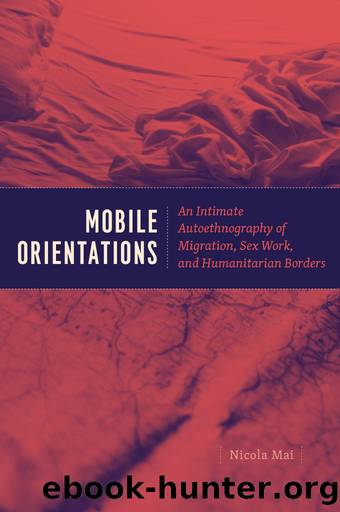Mobile Orientations by Nicola Mai

Author:Nicola Mai [Mai, Nicola]
Language: eng
Format: epub
ISBN: 9780226585000
Google: fO1zDwAAQBAJ
Barnesnoble:
Goodreads: 39105341
Publisher: University of Chicago Press
Published: 2018-01-15T01:08:32+00:00
Rhetorical Evidence
On 1 July 2009, as I watched the parliamentary discussion of the Policing and Crime Bill 2009 on television, I believed for a few hours that scientific research might actually inform policymaking on sex work and migration. My heart leaped when I saw that the research findings of the Migrant Workers in the UK Sex Industry project,1 which I had completed just a few days before, were part of the debate. Baroness Miller of the Liberal Democratic Party used them as evidence to argue against the criminalization of clients, which the Labor government was trying to implement as a way to fight trafficking. The Policing and Crime Bill wanted to give the police even more discretionary power to close down premises arbitrarily âlinked to sexual exploitation.â It also sought to criminalize those who paid for sex with a person âsubject to exploitative conduct,â regardless of whether the client was aware that the person providing sexual services was a victim of trafficking, thus making the purchase of sexual services a âstrict liabilityâ offence.
The police criticized the applicability of the proposed legislation. For instance, Commander Allan Gibson, head of antitrafficking at the Metropolitan Police in 2008, emphasized that the legislation would be hard to enforce, especially given the lack of evidence about whether the majority of women working in massage parlors and brothels had been trafficked; he said that targeted research needed to be undertaken on the issue (Travis 2008). UK sex workers and the organizations representing their rights were even more critical of the proposal to criminalize clients, which they saw as exacerbating workersâ vulnerability to exploitation, violence, and trafficking by pushing the industry farther underground. This situation was by no means unique to the United Kingdom. Globally, the Swedish modelâwhich inspired what ultimately became the Policing and Crime Act 2009âhas been strongly criticized by sex workersâ rights organizations and harm-reduction services on the basis of evidence that the criminalization of clients further marginalizes and invisibilizes sex workers, who then become more exposed to violence, exploitation, and trafficking (Levy 2014).
It was precisely in order to respond to the opposing claims of neo-abolitionist organizations, sex workersâ rights groups, politicians, law enforcement agencies, and projects supporting sex workers that I decided to submit the project Migrant Workers in the UK Sex Industry to the UKâs Economic and Social Research Council (ESRC) for funding. The timing could not have been more relevant: the research was carried out across the period preceding and immediately following the passage of the Policing and Crime Act. The project was undertaken between 2007 and 2009, and produced one hundred in-depth, qualitative interviews with migrant women, men, and transgender people working in Londonâs sex industry. The majority of participants were approached directly through their work contacts and, when appropriate, through their friends and colleagues. All interviews were conducted away from work premises so that research participants would be less likely to censor their remarks for fear of being overheard by people who potentially controlled them. The methodological approach incorporated
Download
This site does not store any files on its server. We only index and link to content provided by other sites. Please contact the content providers to delete copyright contents if any and email us, we'll remove relevant links or contents immediately.
Sex Workers As Virtual Boyfriends by Joseph Itiel(214)
A Trans Man Walks Into a Gay Bar: A Journey of Self (And Sexual) Discovery by Harry Nicholas(194)
Despite All Adversities by Lema-Hincapié Andrés;Castillo Debra A.;(187)
A History of Women in Men's Clothes by Norena Shopland;(179)
Transgender Behind Prison Walls by Baker Sarah Jane Stockwell Pam(177)
One Marriage Under God by Melanie Heath(167)
Transgender Employees in the Workplace by Jennie Kermode(164)
Substance Use Disorders in Lesbian, Gay, Bisexual, and Transgender Clients by Sandra Anderson(160)
Visions of Sodom by H. G. Cocks(159)
Queer TV China by Zhao Jamie J.;(158)
Confronting Religious Denial of Gay Marriage by Wallace Catherine M.;(156)
Lesbian Doms: 10 Women Describe Their Most Memorable Lesbian Domination Experience by Foster Kendra(155)
Consumed by Desire (Central Park South Book 1) by Bianca Vix(154)
Who's Who in Contemporary Gay and Lesbian History Vol.2 by Robert Aldrich Garry Wotherspoon(149)
Lesbian Mothers by Ellen Lewin(144)
She and Her Pretty Friend by Danielle Scrimshaw(140)
Mobile Orientations by Nicola Mai(139)
My White Best Friend by Rachel De-lahay(138)
A Practical Guide to Searching LGBTQIA Historical Records by Norena Shopland(137)
